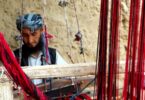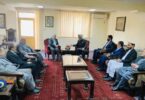Monitoring Desk
KANDAHAR: Afghanistan Independent Human Rights Commission (AIHRC) officials in the southern region say poverty, joblessness, parental inattention and other factors have contributed to an increase in sexual harassment of children in Kandahar province.
Shamsuddin Tanwir, child affairs director at AIHRC, told Pajhwok Afghan News in an exclusive interview seven cases of sexual harassment were registered in Kandahar during the first nine months of the current solar year, compared with only three last year.
He said the actual number of children’s sexual harassment cases was higher than that registered because people did not want to reveal such incidents for cultural reasons.
In general, children involved in hard labour due to poverty were often subjected to such abuse.
“Most of children from poor families are forced into begging or working as labourers are faced with sexual harassment,” he said.
Tanwir alleged parents cared less about such children, who could not earn enough and were easily trapped for sexual harassment. He said around 20,000 children (or two percent of the entire population of Kandahar) were involved in hard labour in the province.
Most of children aged between 15 and 18 are engaged in eight types of hard labour — day labour, working at construction sites, collecting waste, begging and some other tough jobs.
He called scavenging an irritating job for children as it damaged their health. Concrete steps were needed to prevent it, he stressed.
Many children accepted hard labour due to poverty of their families, something linked to war and insecurity that also took lives of many parents, Tanwir said.
Many children were lost to the war and explosions while others were sent into armed conflict, the AIHRC official claimed.
He said they had registered two cases of children working in police ranks and one of the child policemen was recently injured in the Shah Walikot district of Kandahar. Militants also use children as fighters.
He said children’s education had generally improved but 40 percent of minors were still deprived of it.
Girls either had no access to education in districts or were ordered by families to stop attending schools due to cultural restrictions.
It was the responsibility of the government to encourage society to support children and provide them education and healthy training instead of sending them into hard labour, he believed.
Fazal Albari Baryali, provincial information and culture director, also expressed concern over children’s situation. He said there was need for national programmes and mechanisms to improve children’s situation.
It was everyone’s job to help prevent violence against children and provide them with education, he said, asking the government to invest in training of children and public awareness programmes.
A civil society activist, Ahmad Shah Spar, agreed children had been affected by decades of conflict in Afghanistan.
Insecurity, poverty, lack of parental guidance and other problems were being experienced by children, who were forced into hard labour and even crimes, he explained.
Nazir Ahmad is a 14 years old boy forced into child labour due to the poor economic condition of his family. After the death of his father in a bomb blast, he has been the only breadwinner for his family — two sisters and a brother. Ahmad has been working in an auto repair shop to support his family.
He told that despite doing a hard job, the shop owner humiliated him with abusive words and even thrashed him at times.
The boy complained he felt even more lacerated when some people asked him for sexual favors.
Ahmad said he was very interested in going to school but he could not because he was the only one in the family to work and earn.






